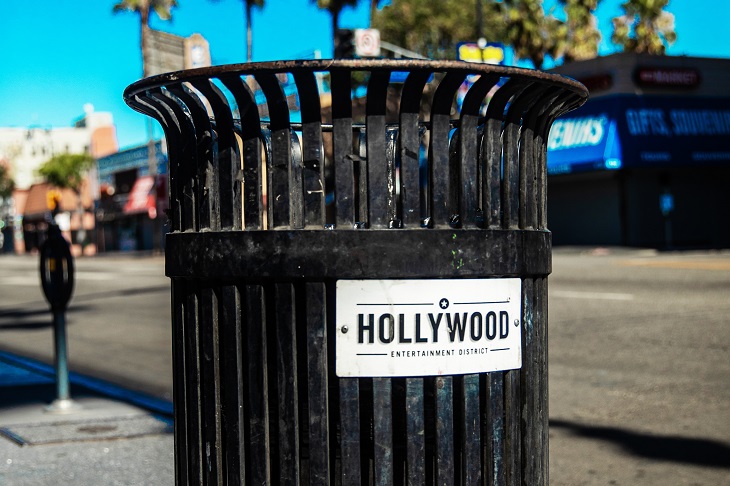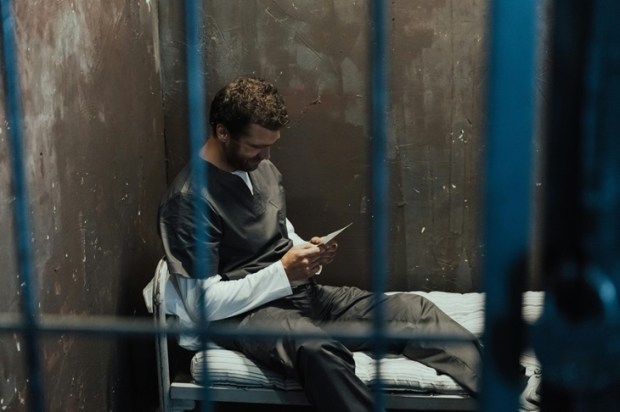It was never going to be my cup of tea. Here was a play proclaimed by a London reviewer as a ‘roll call of real lives shattered by despicable brutality perpetrated by men’.
But it was hard to resist the National Theatre’s screening of Jodie Comer’s much-acclaimed London performance in Prima Facie, even if it meant suffering through a propaganda session from the playwright informing us that one in three women have been sexually assaulted.
I sat surrounded by rows of earnest women who nodded seriously at this absurd statistic. They must have used a pretty broad definition of sexual assault to come up with that one, perhaps inflated by that old chestnut, ‘unwanted staring’.
Jodie Comer is riveting and the play most compelling. It is an utterly fascinating example of how far we have come from the days when female reviewers grumbled that men were winning all the star parts in movies and theatre whilst female characters were cardboard cut-out, one-dimensional props to hero males.
Now the female producers and playwrights churning out much of today’s entertainment are bent on lionising women whilst displaying total indifference to making male characters believable.
They see no problem in the fact that the rape that is at the heart of Prima Facie is not only utterly illogical but also appears to be anatomically impossible.
Warning: spoiler alert for anyone still keen to see this production or others mentioned below.
First, let’s consider the motive for the crime; the reason the rape takes place.
Jodie Comer plays Tess, a successful barrister who happily gets involved with her colleague Damien. She’s keen. ‘I find myself kissing Damo …’ she says, also describing their coupling on the sofa in his office. Is she falling for him? ‘Maybe,’ she says, clearly enjoying the thought of him as her boyfriend.
Then comes the night in question… It begins with dinner at the local Japanese place. Plenty of sake, followed by wine. Home to her place. Intimate talk, kissing, ‘It’s hot and sexy. We seem to fall into having sex,’ she says.
Later they end up in bed with more kissing and cuddling. But suddenly, presumably due to all that alcohol, she has an overwhelming desire to vomit. She makes it to the loo. He’s kind, holds her hair back while she vomits, and then carefully carries her back to bed.
Then, he rapes her. Go figure. Why on earth would he? He’s just had loving sex with her and is apparently enjoying their lusty new relationship.
But according to feminist lawyer turned playwright, this must be just what men do. Patriarchal bullies get their kicks out of asserting their power over vomit-splattered women. No need for any further explanation.
Then there’s the vital question of how it happens. During Act II, which features Tess’s cross-examination, details come out of the attack. Tess describes how she was pinned down. Using one of his hands Damo grips both her hands ‘pulled high above my head’ whilst his other hand is over her mouth, so she can’t cry out. ‘He was squashing me,’ she says, which presumably means he was lying flat on top of her.
My question is how then does he get in? Suffice to say, under the described circumstances it would be tricky without the use of hands and harder still to get traction for what Germaine Greer called the ‘piston mechanics’ necessary for successful rooting.
Recently I found myself discussing all this with a group at dinner and we ended up with guests on the floor trying to work out if the Prima Facie rape scenario was physically achievable – with hilarious results. But no doubt I was the only one in that rapt movie audience remotely concerned about whether this rape was possible.
When it comes to painting men as villains such details don’t matter. Flawed male characters, whether they be dangerous creeps or merely pathetic losers, simply act as foils to the virtuous, scintillating creature that is today’s woman.
One of my favourite movie performances is Bill Murray in Lost in Translation, where he plays a fading movie star stuck filming in a Japanese hotel who befriends a young woman, played by Scarlett Johansson, who is portraying an equally lost soul. He’s in a troubled marriage, she clearly has the hots for him, yet he resists temptation, valuing their growing friendship. It’s a complex, touching story celebrating male restraint and kindness.
That was in 2003, before the rot really set in. Over the next couple of decades, men were pushed ruthlessly from their pedestals. By 2020, Sofia Coppola, the producer of Lost in Translation, again called upon the talented Bill Murray, this time for her comedy On The Rocks, where he portrays a philandering father whose daughter fears her husband is having an affair. In this supposedly jolly romp dad drags his daughter around town spying on the husband, indulging her paranoia with crass comments about ‘that’s the way men are’. No moral complexity here – just degrading stereotypes about men who can’t keep their trousers zipped. Yawn.
Many commentators have picked up on the male heroes’ fall from grace in the movies. There’s a funny rant by Scottish YouTuber, Critical Drinker. It’s called Why modern movies suck – they’re destroying our heroes.
He’s acerbic about the latest Star Wars sequel and talks about Han Solo whom he points out, ‘Started out as a selfish smuggler who only cared about Number 1 but over the first three movies transformed into a smart, resourceful, brave fighter and protector for Princess Leia, ready to risk everything for the sake of his friends. Pretty cool, right?’
The YouTuber then describes the sequel set thirty years later, where Solo is, ‘A cynical, self-absorbed smuggler who’s lost track of his own shit, a dead-beat dad who’s abandoned his wife and son, and an incompetent criminal who’s made enemies across the galaxy.’ Naturally Solo now has to be constantly rescued by a ‘non-diverse female space Jesus’.
Solo is supposed to be in his sixties yet he is ‘somehow less experienced, competent, and mature than when we first met him. All his experiences, his character development and achievements have been rendered completely moot’.
A fitting epitaph, perhaps, to the fate of generations of once competent men in this feminist world?
What bugs me is even when movies try to portray admirable, sensitive male characters, they still can’t get them right. I recently enjoyed Emma Thompson’s outstanding performance in Good Luck to You, Leo Grande. Thompson plays Nancy, an uptight widow who, having never experienced an orgasm, decides to find someone who can show her what she was missing. She lucks out with gorgeous Leo, a sex worker of rare charm and sensitivity.
It’s a clever production, as Leo gradually coaxes the tense, brittle Nancy through her insecurities. He’s quite believable as a complex, intelligent young man who sees his job as a vocation. Yet one scene grated. There’s a critical moment when Nancy pushes too hard in her yearning to play social worker to the young man. Leo reacts with fierce anger and distress to her probing.
Then, without skipping a beat, he’s back on the job, willing and able to tick off the next item on Nancy’s wish list, her desire to perform fellatio. Hmm, the essence of his character is his sensitivity, a soft, sincere man whose emotional accessibility is critical to his craft. Yet the movie’s female playwright Katy Brand glibly assumes his male appendage would snap to attention even as he is still reeling from that emotional upset.
The truth is that the spirit may be willing but this particular flesh is weak and capricious and rarely responds to commands – as any man could tell you. The problem is no one bothers to ask them anymore.
Read more of Bettina Arndt on Substack.

























